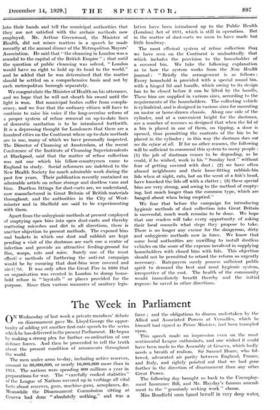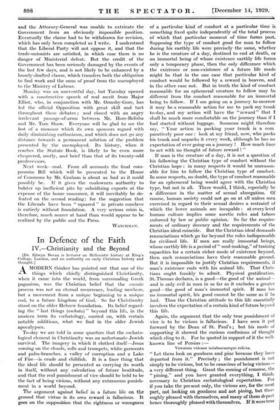The Week in Parliament
ON Wednesday of last week a private members' debate on disarmament gave Mr. Lloyd George the oppor- tunity of adding yet another first-rate speech to the series which he has delivered in the present Parliament. He began by making a strong plea for further co-ordination of our defence forces. And then he proceeded to tell the truth about the present condition of armaments throughout the world.
The men under arms to-day, including active reserves, amount to 30,000,000, or nearly 10,000,000 more than in 1914. The nations were spending 800 millions a year in preparations for war. The "carefully cooked statistics" of the League of Nations covered up in verbiage all vital facts about reserves, guns, machine-guns, aeroplanes, &c. Meanwhile the Disarmament Commission sitting at Geneva had done " absolutely- nothing," and was a farce ; and the obligations to disarm undertaken by the Allied and Associated Powers at Versailles, which he himself had signed as Prime Minister, had been trampled upon.
This speech made an impression even on the most sentimental League enthusiasts, and one wished it could have been made to the Assembly at Geneva, which badly needs a breath of realism. Sir Samuel Hoare, who fol- lowed, advocated air parity between England, France, and Italy, and rightly pointed out that we had gone further 'in the direction of disarmament than any other Great Power.
The following day brought us back to the Unemploy- ment Insurance Bill, and Mr. Hayday's famous amend- ment to the " genuinely seeking work " clause.
Miss Bondfield soon found herself in very deep water, and the Attorney-General was unable to extricate the Government from an obviously impossible position. Eventually the clause had to be withdrawn for revision, which has only been completed as I write. I understand that the Liberal Party will not oppose it, and that the trade-unionists are satisfied, in which case there is no danger of Ministerial defeat. But the credit of the Government has been seriously damaged by the events of the last few days, and is not likely to be enhanced by a loosely-drafted clause, which transfers both the obligation to find work and the onus of proof from the unemployed to the Ministry of Labour.
Monday was an uneventful day, but Tuesday opened with a constructive speech of real merit from Major Elliot, who, in conjunction with Mr. Ormsby-Gore, has led the official Opposition with great skill and tact throughout these debates ; and closed with an angry irrelevant passage-of-arms between Mr. Hore-Belisha and Mr. Tom Shaw. Everyone will be glad to see the last of a measure which its own sponsors regard with daily diminishing enthusiasm, and which does not go any distance towards a permanent solution of the problem presented by the unemployed. Its history, when it reaches the Statute Book, is likely to be even more chequered, costly, and brief than that of its twenty-odd predecessors.
Next week—coal. From all accounts the final com- promise Bill which will be presented to the House of Commons by Mr. Graham is about as bad as it could possibly be. If it gives the coalowners authority to bolster up inefficient pits by subsidizing exports at the expense of the home consumer, it will inevitably be de- feated on the second reading; for the suggestion that the Liberals have been " squared " in private conclave is entirely without foundation. A very serious crisis is, therefore, much nearer at hand than would appear to be realized by the public and the Press.
WATCHMAN.













































 Previous page
Previous page